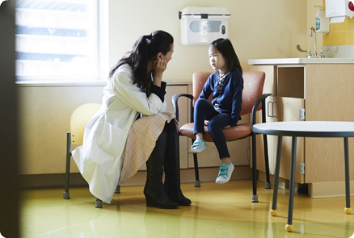 The Adoption Medicine Clinic at the University of Minnesota offers a comprehensive child wellness assessment for children who have experienced early adversity. With a team consisting of a pediatrician or nurse practitioner, occupational therapist, and child psychologist, the assessment includes a medical, developmental, and mental health screening.
The Adoption Medicine Clinic at the University of Minnesota offers a comprehensive child wellness assessment for children who have experienced early adversity. With a team consisting of a pediatrician or nurse practitioner, occupational therapist, and child psychologist, the assessment includes a medical, developmental, and mental health screening.
1. Children in foster care and those adopted may not have had consistent medical care or prenatal care.
Medical providers will complete a comprehensive medical assessment at the Adoption Medicine Clinic (AMC) to make sure they optimize your child’s physical health and nutrition.
2. Adopted and fostered children may have risk factors from before or after their birth that impact their development.
Prenatal substance exposure(s), stress, nutritional deficiencies, lead, exposure to neglect or trauma may affect their developmental progress including speech, learning, strength, and coordination. A child’s everyday life skills, such as getting dressed, tying shoes, writing or the ability to self-regulate their behavior, mood, and energy throughout their day may also be adversely affected. With proper assessment and treatment by pediatric rehabilitation specialists like AMC’s occupational therapists, they can decrease the risk of future medical and emotional health needs and other social risks.
3. Start off on the right foot with your bonding and attachment
or improve any issues or questions that have not improved despite prior best efforts. The renowned Birth to Three program has specialists that screen children (of all ages) at the time of their comprehensive appointments to help identify children at risk or with current mental health needs. They can help you to support your child’s inner resiliency with a mental health screening, specifically looking at risk of trauma and toxic stress. They have connections to community resources and mental health providers to help advance your child and family’s mental health needs. Up to 20% of the families they see each year travel to AMC from all over the world so they can help to coordinate a visit from wherever you are.
4. Children in the adoption and foster care system are at greater risk for prenatal drug and alcohol exposures.
AMC medical providers can screen for prenatal exposures such as Fetal Alcohol Spectrum Disorder so children can get the right support and understanding that they need to reach their potential. Studies show the earlier the diagnosis (when correct) the better children can do with the right tools.
5. The Adoption Medicine Clinic will provide your family with a road map of next steps.
Because they have specialists that can work together to take a comprehensive picture of your child’s needs, the AMC’s goal is to provide education for parents, a children’s primary care doctor, caregivers and staff about who your child is and how to help them thrive. They also provide home and school programming recommendations, including suggestions to incorporate into home routines or special learning plans.
Even children who were adopted very young or at birth may have experienced stress in utero or in their early life. Many children do fine in the early years. However many children have seemingly small issues with sleep, learning, anxiety, or other common medical or developmental issues. When these are addressed as early as possible, children are much better able to weather puberty and other life changes as they come along. The earlier we can intervene, the greater chance we have to minimize future challenges. Academic or behavioral struggles may become more apparent as children grow older or advance to the next grade level. Waiting to seek help until puberty or later can complicate underlying issues. When parents and caregivers understand the needs of their child, they are better prepared to meet those needs and help their child thrive for the long term.
About the Author: This article was written by Judith Eckerle, MD, the Director of the Adoption Medicine Clinic (AMC) at University of Minnesota. Founded in 1986, the AMC is a global leader in research, education, advocacy, and adoption medicine. Internationally and domestically adopted children and children in foster or kinship care often have early life transitions or trauma. No matter their place of origin, these children often face similar challenges. The AMC care team is a world leader in adoptive and foster care child health.
Call to schedule an appointment at 612.365.6777.
For other questions or more information please call 612.624.1184.
Visit adoption.umn.edu to learn more.
*Photo Courtesy of Jonathan Chapman/JCP


